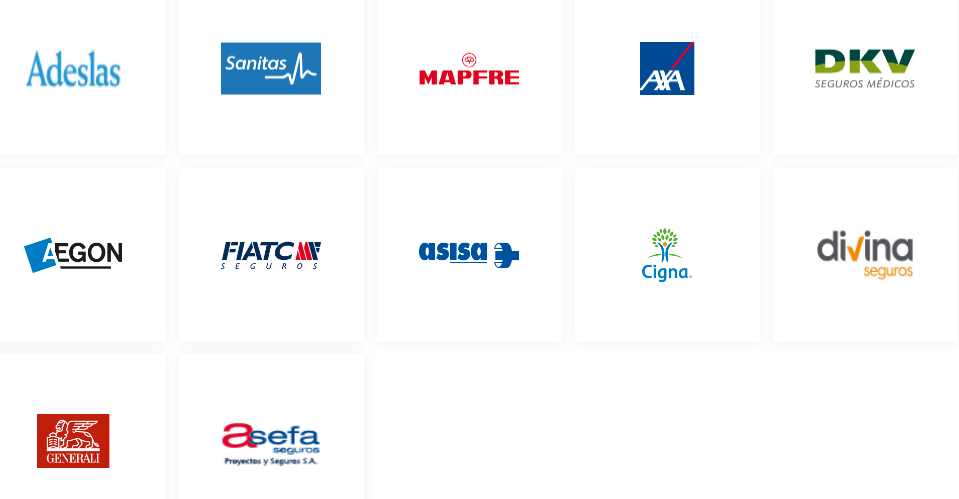
Public healthcare (Seguridad Social) in Spain is among the top in Europe and is completely free. Yet there are many Spaniards and foreign residents who insure themselves through private healthcare insurance. The reason for this could be, for example, shorter waiting times, more luxury (for example, a private room with the partner after an operation) and more freedom of choice for doctors and doctors (for example a second opinion).
Another advantage the medical staff in commercial/private healthcare speaks English.
Inhoud
Spanish insurance companies
Many Northern European insurances cover the Spanish private health costs, such as a visit to a specialist, hospitalization, emergency assistance, etc. However, for those who live temporarily or permanently in Spain, it may be interesting to take out additional insurance here. The more expensive companies with the widest package are, for example, Sanitas, DKV and Mafre. Adeslas is competitively priced and has a large market share. There are also more well-known companies such as AXA, Allianz, Caser, Asisa and Aegon. Some of the companies have medical centers under their own name with exclusive doctors.
All companies have their own rules, of course. For example, you usually do not need to request permission for a medical procedure at the private healthcare insurance company Sanitas.
Differences in health insurance packages
Almost all health insurance policies have special discount and discount promotions, such as:
- the free or advantageous co-insurance of children
- discount packages for companies
- optional care such as for the dentist (for children the dentist is free via the Seguridad Social) or gynecologist
- discounts at the gym
- free second opinion
- consults via video conferencing (Skype)
- optional coverage abroad (sometimes also with travel insurance), etc.
So try to compare as well as possible and if necessary ask for English-speaking staff via the telephone. Often you get a discount if, in addition to private healthcare insurance, you also have household insurance or car insurance with the relevant company.
Policy costs and cuadro medico
Not only the monthly premium and general conditions of the “seguro medico” or “seguro de salud” are important in the choice of good healthcare insurance. Often the ‘cuadro medico‘ (existing specialists and hospitals) is decisive and there are major differences. It may well be that because of the reimbursements your local, English-speaking general practitioner only works with one insurance company.
The premium also depends on age, gender, place of residence and medical history. The premium normally increases every year and in case of heavy use of the policy (for example an operation), the monthly premium of the health insurance can be further increased.
Carencias expire upon transfer
If you switch from another company, the advantage is that the ‘carencias‘ often expire. This is a fixed time when, for example, you are not allowed to have more expensive medical tests or surgery, usually between 3 and 12 months. Often the insurance excludes the costs for the birth in a private clinic within the first 9 months. Competition between the companies is fierce and normally a switch has to be made before a certain date. As a result, there are many interesting offers for the coming year around the end of the year (October) time.
Exclusion in pre-existencias
Pre-existencias (pre-existing conditions or defects such as (chronic) illnesses or operations) must be reported by forwarding the ‘informes medicos’ (information letters from the specialist). The insurance normally excludes all medical expenses related to the condition or pre-existence problems. It probably sounds tempting to simply hide past problems. However, you run the risk of later problems and associated costs. Of course, you can still opt for insurance and use the Seguridad Social for the specific exclusion.
There are also a few companies that accept illnesses such as diabetes, but the monthly premium costs of the policy can easily be twice as expensive.
Healthcare insurance intermediaries/brokers
If desired, the insurance can be taken out through an intermediary or intermediary who works on a commission basis. The intermediary can work exclusively for 1 company and use its logo or he can act as a broker/intermediary / agent for several insurance policies. You can of course expect extensive information from a physical office about the jumble of offers and conditions. However, keep in mind that you are not talking to the insurance itself, but to a commercial intermediary who may be inclined to opt for the highest commission.
Spanish healthcare insurance companies
The insurer is not responsible for incorrect/verbal information and may also have closed its office a year later. Incidentally, the price comparison sites such as El Rastreator also work on a commission basis and the offer plus the information of the policies is not always complete.

Medication Reimbursements
Keep in mind that medicines and repeat prescriptions are in principle not reimbursed by private healthcare insurance. However, a (repeat) recipe can often be arranged via the Seguridad Social (Centro de Salud). In many cases, the reimbursement of cover for medicines is higher / better than in the North of Europe.
Public vs private healthcare
Opinions are divided on whether private healthcare is really better than free public healthcare. The fact is that private specialists earn more and have more expensive medical equipment. On the other hand, public university hospitals in particular have a lot of centered knowledge, partly due to their own research departments. For example, there are public hospitals that have much more knowledge in the field of cancer than private care centers. What you see more often is that specialists work in both public and private healthcare. This is especially if they still have to build a customer base.
Personal note… This sometimes leads to questionable situations that seem strange to the Dutch or Belgians, as I also described in my emigration book Toekomst & Tapas. For example, I personally had to deal with an emergency (severe food intolerance in an 8-month-old baby) for which there was a 3-month waiting period in the public hospital (!?!). However, there was an option to make a private appointment with the specialist. Then he could suddenly shorten the procedure in the hospital himself to 1 week … Incidentally, the very expensive milk replacement (Neocate) of € 60 per 400 grams was reimbursed 100% for up to 2 years. The reimbursement in the Netherlands is 50% for this.
